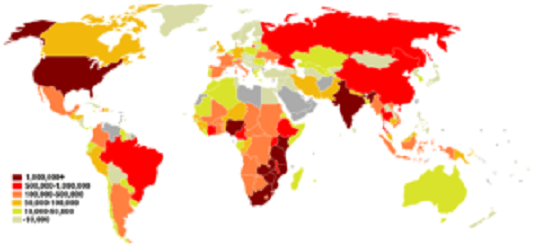Do You Know Your HIV Status?
By Quam Kelani, Key Correspondent for the Irish Forum for Global Health
December 1, 2018 marked the 30th anniversary of World Aids Day. This year’s theme was “Know your status”. UNAIDS highlights the progress towards ending the HIV/AIDS epidemic but also highlights how much more we have to do (1). This involves making people aware of their HIV status in other to have access to either prevention or treatment services.

Despite the improving statistics on HIV, we have vulnerable groups and key populations at increased risk of HIV. This is influenced by their living conditions and lifestyle. Examples of key populations are sex workers, injecting drug users (IDU), people of diverse sexual orientation and disempowered women such as adolescent girls and young women.
Stigma and discrimination prevents people from accessing HIV testing and treatment services. Therefore, we encourage zero discrimination against people living with HIV. The World Health Organization and UNAIDS launched the Agenda for Zero Discrimination in Healthcare in 2016 (3). The aim is to achieve a goal where everyone in the world can access good healthcare treatment without discrimination. WHO/EMRO organizes interventions targeting vulnerable groups and key populations in different countries by providing technical support and capacity building depending on the country’s need (4). We as individuals need to support one another and leave no one behind by raising awareness concerning HIV as well as being a support system by organizing support groups and community outreach.
Different ways have been adapted to increase access to HIV tests. Some of these methods are Self-tests, multidisease tests and community-based tests.
Knowing our HIV status allows us to make choices on our right to health. It increases the chances of receiving treatment from a range of different preventive and sustainable options depending on a person’s HIV status. It gives us the opportunity to screen for other illnesses such as tuberculosis, diabetes and hepatitis Pregnant or breastfeeding mothers living with HIV are able to prevent HIV transmission to their babies by receiving antiretroviral treatments. An effective HIV treatment prevents HIV transmission from one person to another by reducing the viral load in a person to an undetectable level.
One of the subset goals underneath Sustainable Development Goals 3 (Good Health and Wellbeing) is to end the epidemic of AIDS by 2030 (5). This means 90% of people should be aware of their HIV status, 90% people are on HIV treatment and 90% people are virally suppressed. That is an estimated 30 million people on treatment and less than 500 new HIV infections per year. According to Father Michael Kelly “To achieve this, this means to stop all new HIV infections, everyone of them, ensuring every HIV infected person has access to life preserving antiretroviral drugs and making it a daily routine to take their prescribed medicines. In other words, leave NO ONE behind”. The first step to achieve this is to know your HIV status.
2nd January 2019
References:
global-aids-monitoring_en.pdf. Available from: http://www.unaids.org/sites/default/files/media_asset/global-aids-monitoring_en.pdf
Global HIV & AIDS statistics — 2018 fact sheet . Available from: http://www.unaids.org/en/resources/fact-sheet
2017 Zero Discrimination HealthCare pdf . Available from: http://www.unaids.org/sites/default/files/media_asset/2017ZeroDiscriminationHealthCare.pdf
WHO EMRO | Vulnerable groups and key populations at increased risk of HIV | Health topics | AIDS and sexually transmitted diseases. Available from: http://www.emro.who.int/asd/health-topics/vulnerable-groups-and-key-populations-at-increased-risk-of-hiv.html
WHO | SDG 3: Ensure healthy lives and promote wellbeing for all at all ages. WHO. Available from: http://www.who.int/sdg/targets/en/
CATEGORIES
- Restore Humanity Campaign
- Equity in Action Blog
- Training Programmes
- Sponsorship
- Vaccine Equity
- Get Global – Global Health Talks
- Student Outreach Team
- Get Global Young Professionals Talk Global Health
- Global Health Matters – Live Event Series
- Global Health Matters – IGHN Live Event Series
- An initiative of Irish Global Health Network
- ESTHER Ireland and ESTHER Alliance for Global Health Partnerships
- Global Health Matters – Webinar Series
- ESTHER
- IGHN Conferences
- Global Health Conference 2020
- Women in Global Health – Ireland Chapter
- ESTHER Partnerships
- Weekly Webinar Series
- 4th Global Forum on HRH
- Access to Medicines
- Archive Page Weekly COVID Webinars
- Clean Cooking 2019
- Climate Change and Health Conference 2017
- Conference Abstracts
- Conference Materials
- Covid FAQ
- COVID Funding Opportunities
- COVID-19
- COVID-19: Gender Resources
- Dashboard and online resources
- Education
- ESTHER Alliance
- Events
- Events & News
- Funding covid
- Global Health Exchange 2018
- Global Health Exchange 2019
- Global Health symposium 2019
- Health Workforce/HRH
- Homepage Featured
- Homepage recent posts
- IFGH 2011-2012 Conference and Events
- IFGH 2014 Conference
- IFGH Multimedia
- Irish AIDS Day 2017
- Irish News and Feeds
- Key Correspondent Articles
- Key Correspondent News
- Maternal Health
- Multimedia
- News
- News & Events
- Newsletter
- Opportunity
- Our LMIC's Resources for COVID19
- Partner Country News and Feeds
- Past Events
- Policy
- Presentations
- Recurring events
- Reports & Publications
- Research
- Resources
- Student Outreach Group
- Students Corner
- TEDTalks
- TRAINING COURSES FOR HEALTH CARE PROFESSIONALS
- Uncategorized
- Upcoming Events
RECENT POSTS

Impact testimonies- Lombani

Impact Testimony – Shadrick

Power, Inequality, Decolonisation – and Living My Recovery By Bronwyn April

Global Health Without Borders: Reflections on the Power of Diverse Voices

IGHNxEU – Empowering Women for a Healthier Europe

